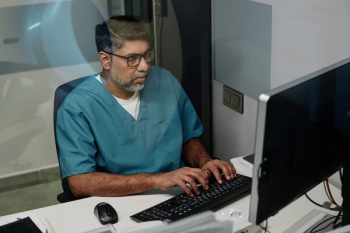
Does Location Really Matter?
Does it really matter where you practice-especially as teleradiology becomes more popular?
One of this month’s Editorial themes regards
Being a telerad for nearly 8 years now, I haven’t really had to think about such things. Even before that, it wasn’t much of a consideration: I knew where I wanted to live, and that (New York) was therefore the state in which I would be working. No point in thinking about whether I might do better-or worse-elsewhere.
At least, there was no pragmatic point. That didn’t stop me-and a bunch of other rads in my neck of the woods-from intermittent bellyaching about how the job-market in our area was saturated, because it was a very desirable place to live. Whether or not the field as a whole was favoring job-seekers or employers at any given time, people always wanted to live there. Employers could thus offer far less-favorable terms than in many other locales, and know that they’d have little trouble filling positions.
Local variations in the radiology job-market, I suspect, remain the No. 1 “which state is best/worst” factor for most rads seeking to work in conventional, onsite jobs. Or, perhaps, to start their own practices.
Meanwhile, I’ve never lost sight of an expectation I formed in medschool: I reasoned that the then-newfangled Internet should, eventually, allow a diagnostic rad to work anywhere from anywhere, as long as there was sufficient connectivity. Jobs within a hundred-mile radius of my home might feel at liberty to be crummy, even abusive to their rads-but halfway across the country, if not the world, there would be areas that were desperate for help, and thus far more appreciative of it.
Indeed, teleradiology became a thing for precisely such reasons. And not just big corporate entities gobbling up contracts right and left, but at last some smaller groups have realized that “virtually staffing” with remote members can be much more efficient than trying to entice rads to physically relocate.
What’s in a State?
As differences between local job-markets thereby diminish, other factors start to loom larger in the “which state is best/worst” question. One of the first that came to my attention was the matter of state income-taxes. Simply put, if you can live anywhere because you work via telerad, why not make it somewhere that takes a smaller chunk of your earnings? Or none at all? Sunny Florida, for instance. The same goes for property taxes, or really indeed any other cost-of-living expenses one might want to reduce.
States also have different wrinkles when it comes to getting and maintaining medical licensure-and if you’re a telerad it’s not uncommon that you’ll need/want to maintain a license in whatever state you’re working from, even if you aren’t actually reading cases from that state. Other things being equal, you might want to choose a “low maintenance” state with a physician-friendlier Medical Board. (A bit of looking around in online forums might give you an idea as to which SMBs are, shall we say, less friendly.)
Then there’s the matter of state-by-state variations in medical-malpractice law. The waters have gotten rather muddy, here-you can’t always rest assured that, because you live in a tort-reformed state, that will be the venue for actions brought on the basis of work you virtually performed in another jurisdiction.
Still, digging a little into the specifics of a situation you’re considering might reveal that living in state A while working for state B can provide you better protection than if you lived in state C. Such factors might percolate down to impact the medmal premiums you’ll be paying.
Finally, there are regulatory “nuts and bolts” that sometimes come into play, depending on what state you choose to live in while working elsewhere. I’ve found them to be of nuisance-level value, hardly something that would make or break an otherwise-sound deal-though your mileage may vary.
Personal Experience
Off the top of my head, a couple of items that I got to deal with as a telerad living in NY state: Turned out there were more stringent requirements about specs for my monitors (and no, I wasn’t reading mammo), including routine calibrations and reporting of same.
Another little gem: As an independent contractor in this state, even though I exclusively worked from home, I was required to pay a “commuter tax” every quarter. And many states, mine included, have what we’ve come to call “nuisance CME” requirements to maintain licensure-blanket requirements for all docs, no matter how irrelevant to their practice. For instance, as a doc who never writes prescriptions at all, I regularly have to do courses on opioids, signs of abuse, etc.
An awful lot of this stuff doesn’t become apparent to the individual rad until s/he’s in the thick of it, at which point there’s little to be done unless it’s so vexing as to be worthy of relocation. I’m not considering a move at any point in the visible future, but if I were, I might spend some time communicating with other rads already living in my prospective new state (in online forums, if I didn’t personally know any). I’d hope to benefit from the firsthand experience of other folks, rather than slowly, and possibly painfully, having to acquire it on my own.
Newsletter
Stay at the forefront of radiology with the Diagnostic Imaging newsletter, delivering the latest news, clinical insights, and imaging advancements for today’s radiologists.












